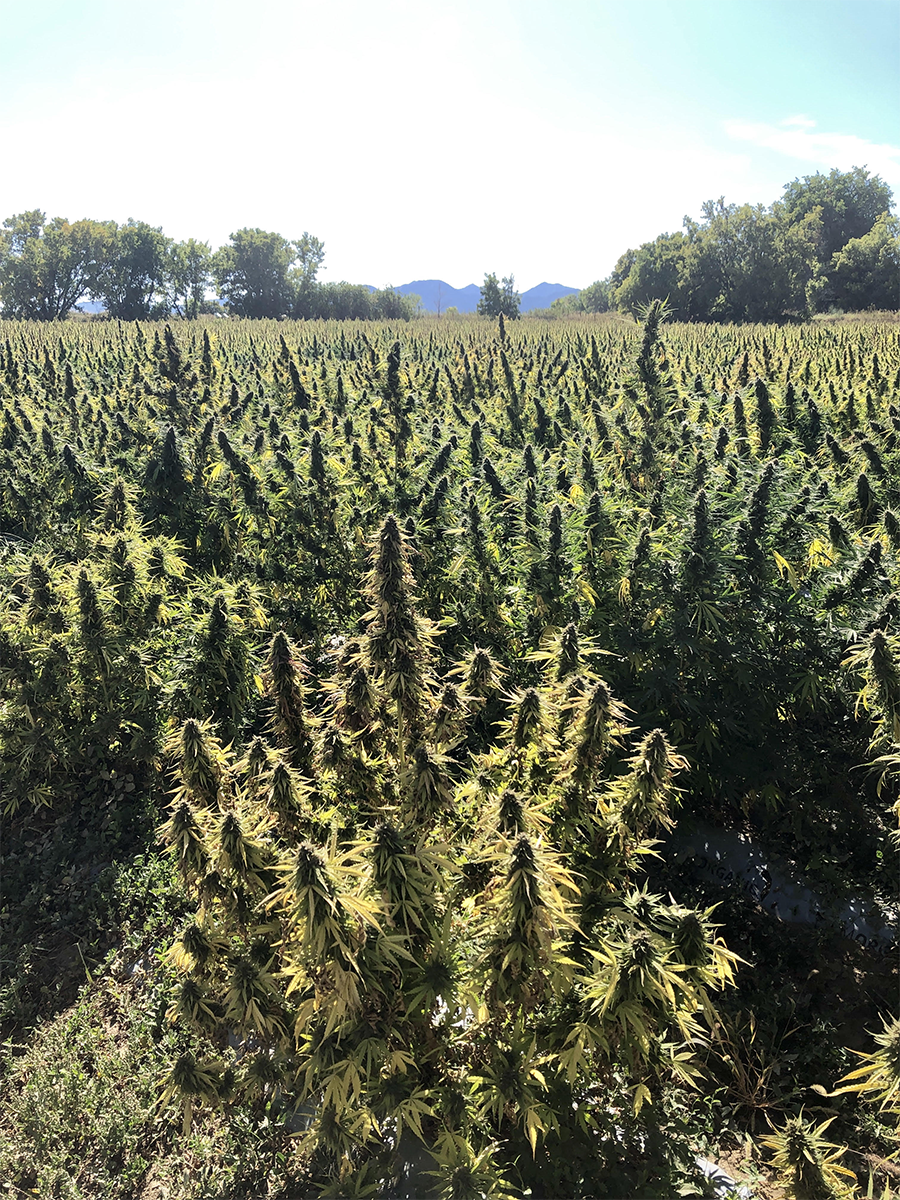
By Steven Hoffman
While farmers across America faced a number of challenges growing hemp this past season, when all is said and done, it is estimated that the total number of acres of hemp harvested in 2019 increased approximately 50% over the 2018 harvest.
Vote Hemp, a Washington D.C .-based advocacy group, reported in its 2019 U.S. Hemp Grower License Report that nearly 511,442 acres of hemp were licensed in 34 states this year – a four-fold increase over acres licensed in 2018. Of that total licensed acreage approved for the 2019 growing season, Vote Hemp estimates that about half, or 230,000 acres, of hemp was actually planted. This year’s U.S. hemp harvest is expected to come in at 115,000 – 138,000 acres, in part due to losses from crop failure, adverse weather, non-compliant crops, and other factors, says Vote Hemp. Compared to 78,126 acres of hemp harvested in 2018, this represents about a 50% increase in acres of hemp harvested in 2019.
While that brings much cause for celebration for the first “legal” hemp harvest in the U.S. since historic passage of the 2018 Farm Bill, it also brings pause and perhaps concern for many farmers caught between bad weather, a potential glut of hemp crop that could drive prices down, and for many, difficulty in finding buyers to bring their hemp to market. As growers across 34 states harvest this year’s crop, many newcomers have no idea who will buy their crop or even who will prepare it for sale, Barry Paterno, a Tennessee hemp farmer, told the Philadelphia Inquirer.
“A significant number of farmers rushed into farming hemp without having a plan in place,” Eric Steenstra, President of Vote Hemp, told UPI. “Since we’re not a commodity crop yet, it’s challenging for people to take this crop to market. You can’t just sell it like corn or soybeans yet.”
Hemp Seen by Farmers as an Alternative to Survive Trade War
In addition, according to the New York Times, the promise of profits attracted many Midwestern farmers in 2019 who see hemp as an alternative to corn and soybean crops – and as a way to ride out President Trump’s trade war with China.
Despite the hype around hemp — particularly hemp-derived CBD, hemp is harder to grow, process, and sell than many first-time growers realize, reported the Philadelphia Inquirer. And the flood of hemp hitting the market this year likely will lower prices and profits. “It’s a high-risk crop — it’s hard to find markets,” Matt Cyrus, President of the Deschutes County (Oregon) Farm Bureau and a farmer who has been growing hemp for CBD since 2016, told the Inquirer.
According to UPI, since May, the price of isolate, a pure CBD derivative substance, fell by half from about $6,200 per kilogram to about $3,100 per kilogram in Colorado, according to PanXchange, a hemp pricing exchange. CBD oil started to accumulate on the market when online CBD sales slowed this spring after credit card processing companies stopped working with CBD sellers, as many CBD sellers are online, Chris Fontes, founder and CEO of Oregon-based Hemp Exchange, an online buying and selling platform, told UPI.
Weather has been a factor, too, as it always is in agriculture. While Oregon is rapidly emerging as a leader in hemp production, hail early in the season and wet weather late in the season caused crop and mold damage; similarly, many hemp farmers in Tennessee lost crop due to mold, and excessive wet weather and humidity affected Midwestern and Mid-Atlantic growers. Early snow affected harvests in the Pacific Northwest and in Colorado and heavy spring rains affected Midwestern farmers, too.
Yet, a number of states reported promising harvest seasons, including Alabama, Rhode Island and Indiana, and despite adverse weather, positive harvests are being reported in North Carolina, Colorado, Kansas and elsewhere around the country.
Other Factors Farmers Face in Harvesting Hemp
Drying plants takes up a lot of room – about 38,000 cubic feet for an acre of hemp, UPI reports, and plants must be kept in a climate-controlled space for weeks – or mechanically dried with blowers or a nitrogen infusion process.
In addition, a lack of a sufficient number of extractors has been called the “bottleneck” of the hemp industry, Chris Fontes of the Hemp Exchange told UPI. “There hasn’t been the ability to install the infrastructure to support” the hemp industry, Roger Cockroft, CEO of Delta Separations, a manufacturer of hemp processing equipment, said in an interview with Chicago Business.
Cockroft also pointed out in Hoosier Ag Today that a lack of hemp processing equipment is due to the fact that U.S. banks are hesitant to make loans for processing equipment. Banks are “scared that the FDIC will penalize them for supporting anyone that has the word cannabis in their supply chain,” he said. The U.S. lacks roughly 90% of the processing capacity needed for hemp, Cockroft added.
Hemp Harvest Celebrations Scheduled
Despite – or perhaps because of – the hardship and hard work in bringing a successful hemp harvest to fruition, farmers, producers, processors and the hemp community are celebrating a historic 2019 harvest season. Kentucky growers gathered recently for the Kentucky Hemp Harvest Fest Dinner at the Bluegrass Heritage Museum in Winchester, KY. Producers in southern Michigan are hosting a Hemp Harvest Party & Mural Raising on October 19 in Jonesville, MI. In North Carolina, the Carolina Hemp Company is teaming up with NCIHA to host a Harvest Party in Asheville on October 12, with a special appearance by Rick Trojan of the Hemp Road Trip.
And in Colorado, the 6th Annual Hemp Harvest Party, set for October 18 at Oskar Blues in Longmont, CO, brings together an industry of trail blazers and leaders who have worked hard to accelerate the progress made during this year’s planting, growing and harvesting season. The event will feature Fort Collins comedian Luke Gaston along with live music, a DJ and catered food with the purchase of a ticket. The 6th Annual Hemp Harvest Party is presented by Restorative Botanicals and hosted by the Colorado Hemp Project and the Colorado Hemp Company, producer of the 7th Annual NoCo Hemp Expo, March 26-28, 2020, in Denver.
# # #
Photo: Compass Natural
 Steven Hoffman is Managing Director of Compass Natural, providing brand marketing, PR, social media, and strategic business development services to natural, organic, sustainable and hemp/CBD products businesses. Compass Natural serves in PR and programming for NoCo Hemp Expo and Southern Hemp Expo, and Hoffman serves as Editor of the weekly Let’s Talk Hemp Newsletter, published by We are for Better Alternatives. Contact steve@compassnaturalmarketing.com.
Steven Hoffman is Managing Director of Compass Natural, providing brand marketing, PR, social media, and strategic business development services to natural, organic, sustainable and hemp/CBD products businesses. Compass Natural serves in PR and programming for NoCo Hemp Expo and Southern Hemp Expo, and Hoffman serves as Editor of the weekly Let’s Talk Hemp Newsletter, published by We are for Better Alternatives. Contact steve@compassnaturalmarketing.com.



